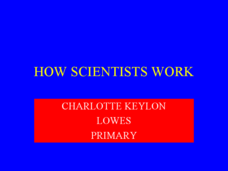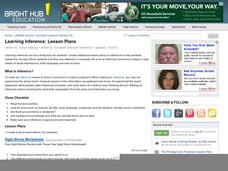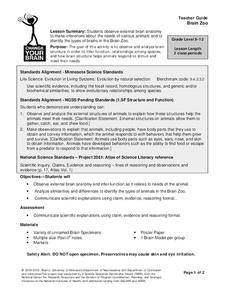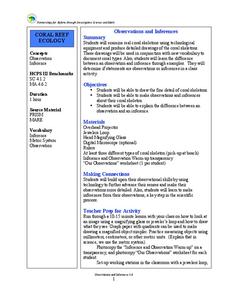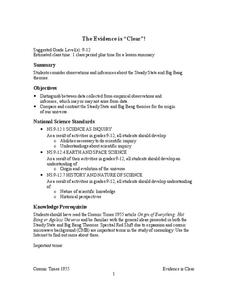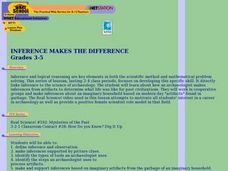Chicago Botanic Garden
Recognizing Change (Observation vs. Inference)
What is the difference between making inferences and making observations? Young climatologists refer to a PowerPoint to make observations on each slide. They record their observations in a provided worksheet before drawing a...
Curated OER
What Can We Learn From the Past?
What would future archeologists learn from your scholars' personal belongings? Have them bring in a box of "primary sources" from their home. Discuss the difference between observations and inference, using some of your own items to...
American Physiological Society
Did I Observe it or Infer it?
Take the mystery out of inquiry! When young scientists learn to use their keen powers of observation to make smart inferences about a situation, they are well on their way to understanding what the scientific method is all about. Using...
Ohio Department of Education
Observe Then Infer
To develop their skill at drawing inferences from observations, sixth graders rotate through six stations, conduct a series of experiments, make observations, and draw inference from what they observe.
UAF Geophysical Institute
Observing the Weather
How can you predict the weather without any technology? Young scientists learn to forecast the weather using traditional Native American techniques. Based on their observations of the weather, as well as talking to their classmates, they...
EngageNY
Building Background Knowledge and Making Inferences: What Is a Natural Disaster?
That's a disaster! Scholars complete a gallery walk to view images and make inferences about natural disasters. They fill out a note catcher about what they observe and infer any questions they may have. They then participate in a World...
Curated OER
Transparent Shoebox Dig
Take this simulated archaeological dig one layer at a time with your young pupils to encourage observation, critical thinking, and careful attention. Using a transparent box full of layers of sand and artifacts, pupils examine the...
Curated OER
Observation vs. Inference
Student observe two cups, one slightly smaller and skinnier than the other, with one put inside the other. The cups are turned upside-down and the smaller one is caught as it falls out of the larger cup. The larger cup is filled up about...
Curated OER
How Scientists Work
The arsenal of tools a scientist uses to observe the world are varied. This great presentation gives students a look at some of the strategies they should use when looking at the world around them. The information can be used as a...
Curated OER
Observations and Inferences
Students observe how to distinguish observations form inferences. In this examining inferences lesson students list observations relating to the activity and discuss the importance of them.
Curated OER
Learning Inference
Making inferences can be a tricky proposition for middle schoolers. In the lesson plan presented here, pupils practice the skill of drawing a conclusion and making a judgment - which are what making an inference is all about! There are...
University of Minnesota
Brain Zoo
Who doesn't love a day at the zoo? Use an observation and inference lab to get young anatomists to recognize similarities between mammalian species based on brain structures. You provide the brains; this lesson provides set-up...
Nuffield Foundation
Observing Water Moving Through Plants
We know plants assist in the water cycle, but how do plants get water from the ground into the air? Through a series of demonstrations or labs, scholars observe the movement of water through plants. They microscopically view the cells...
Curated OER
Observations and Inferences
Students examine coral skeletons. In this science lesson plan, view real coral skeletons. Students explain the differences between an observation and an inference. Students draw a coral skeleton.
Curated OER
Pop Rock Chemistry
In this pop rock chemistry worksheet, students suck on pop rocks, they mix open pop rocks with water and they observe them on a paper towel with water. Students write down as many observations as they can and they write down as many...
NASA
The Evidence is “Clear”!
Do you think you know better? Become a scientist and prove it. Scholars review the evidence for two different theories of the origins of the universe. They notice the empirical observations as well as the inferences to determine which is...
Curated OER
Memories to Last: Observing Monuments
Students use scientific observation and inference to examine the Hazen Brigade Monument. In this observation lesson, students review the reasons for building monuments in society. Students then recall monuments they have seen and draw...
Curated OER
Inference Makes the Difference
Students explore how archaeologists make inferences from artifacts to explore what life was like in the past. In this archaeology lesson, students work in groups and make inferences about an imaginary household based on modern day...
EngageNY
Making Inferences About Informational Text: Science Talk on How My Insect Contributes to the Rainforest Ecosystem
We need to talk. Learners participate in a science talk by discussing the idea of how insects are important to the rainforest. They record notes about their conversations as they talk. For homework, pupils add to their field journals.
Curated OER
Inference By Analogy
Learners infer the use or meaning of items recovered from a North Carolina Native American site based on 17th-century European settlers' accounts and illustration.
Curated OER
Archaeology
Students compare and contrast the role of scientists with that of archaeologists. They also describe the roles of observations and evidence in science.
Curated OER
A is for . . .
Students discuss the difference between making inferences and observations. They practice making observations and inferences regarding an apple.
Curated OER
Project 1
Students are given a coin to observe and make inferences about. Using a worksheet, they make two columns to list their observations and inferences in an organized manner. They develop a hypothesis based on one of the inferences and...
Curated OER
Scientific Thinking
Students participate in four different activities which reinforce an understanding of they way scientists think about the world. They make careful observations of two different pennies, write the procedure for making a peanut butter and...
Other popular searches
- Observation Inference
- Observation and Inference
- Observation Inference Lab
- Observation vs Inference
- Observation Inference Demo
- Observation vs. Inference
- Observation Inference Science










